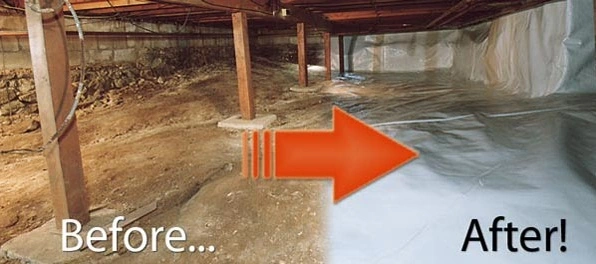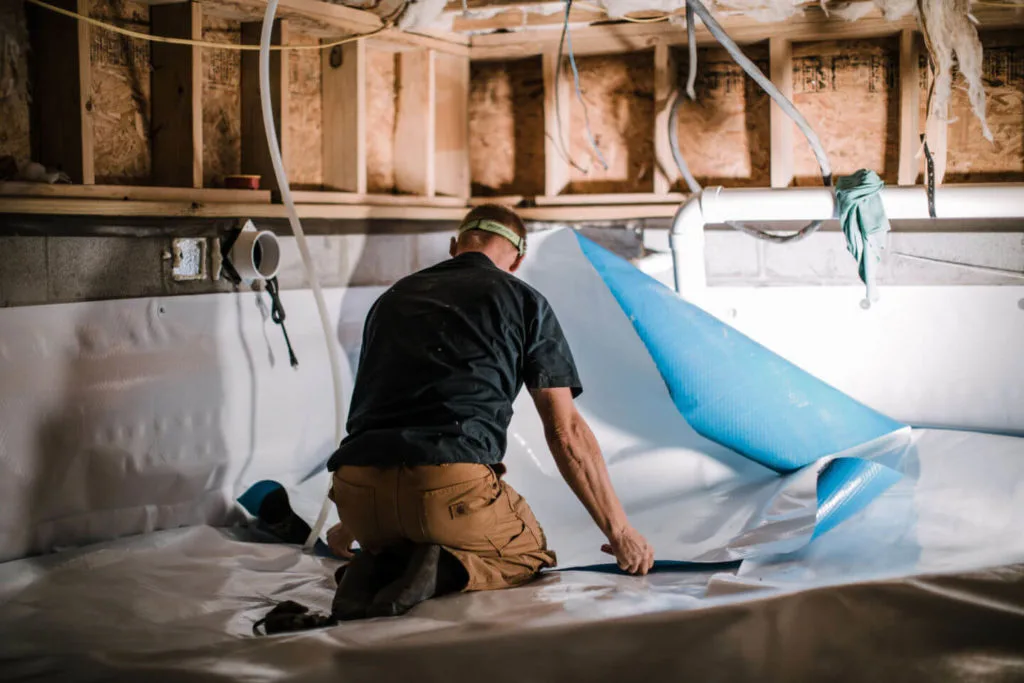
The Ins and Outs of Crawl Space Encapsulation: Pros and Cons in Westminster
Crawl space encapsulation is a vital home improvement technique that is gaining popularity in Westminster. This process involves sealing the crawl space beneath a house to protect it from moisture, pests, and other environmental factors. Crawl space encapsulation is particularly relevant in Westminster due to its climate, which is characterized by varying temperatures and precipitation levels throughout the year.
The city's humid summers and cold winters can lead to moisture buildup in crawl spaces, contributing to mold growth, structural damage, and poor indoor air quality. Understanding the pros and cons of encapsulation can help Westminster residents address these issues effectively and ensure their homes' long-term health and integrity.
In this post, you will learn about the benefits and drawbacks of crawl space encapsulation in Westminster, helping you make an informed decision for your home.
So, let's delve into the details and discover how crawl space encapsulation can benefit you and your home in Westminster.
Crawl Space Encapsulation: An Overview
Crawl space encapsulation is used to seal off the area beneath a home, preventing moisture, pests, and other unwanted elements from entering. This technique covers the floor, walls, and even the crawl space ceiling with a durable barrier, typically made of plastic or foil. By creating a tight seal, encapsulation helps maintain a clean environment under the house, which can benefit homeowners.
One of the main advantages of crawl space encapsulation is moisture control. Encapsulation helps prevent mold and mildew growth by keeping moisture out, which can cause structural damage and lead to health issues for occupants. Additionally, encapsulation can improve indoor air quality by reducing allergens and pollutants that may enter the home through the crawl space.
Furthermore, crawl space encapsulation can contribute to energy efficiency. By sealing off the crawl space, encapsulation helps to prevent air leaks and drafts, reducing the workload on heating and cooling systems. Overall, crawl space encapsulation is an effective solution for protecting homes from moisture-related problems and improving overall indoor air quality and comfort.
Pros of Crawl Space Encapsulation
Crawl space encapsulation offers several benefits for homes and buildings.
Improved Air Quality
One significant advantage is the improvement in air quality. Sealing off the crawl space prevents outside pollutants like dust, pollen, and pests from entering the home.
Reduced Humidity Levels
Another positive aspect is the reduction of humidity levels. Too much moisture in crawl spaces not only increases health risks but can also cause structural damage to the property. Encapsulation helps to control moisture levels by creating a barrier that prevents water vapor from seeping into the crawl space, thus lowering the risk of mold and mildew formation.
Prevention of Mold and Mildew Growth
Additionally, crawl space encapsulation aids in the prevention of mold and mildew growth. Encapsulating the crawl space and controlling moisture levels eliminates the conditions necessary for mold and mildew to flourish, safeguarding the health of occupants and preserving the integrity of the building's structure.
These advantages contribute to a healthier and more comfortable living environment while protecting the property from potential damage. Crawl space encapsulation is a renowned investment for homeowners looking to improve air quality, reduce moisture-related issues, and maintain the structural integrity of their property.

Cons of Crawl Space Encapsulation
Crawl space encapsulation can offer numerous benefits for homeowners, such as improved indoor air quality, energy efficiency, and protection against moisture issues. Well, it's essential to consider the potential drawbacks before investing in this solution.
Initial Cost
One of the main drawbacks of crawl space encapsulation is the initial cost. The process involves:
Sealing off the crawl space with a moisture barrier.
Installing insulation.
Consider adding a dehumidifier or ventilation system.
These expenses can increase, especially for larger crawl spaces or homes with complex layouts.
Potential for Incorrect Installation
Improper installation of crawl space encapsulation can lead to a host of problems. If the moisture barrier is not installed correctly or gaps are left unsealed, moisture can seep into the crawl space, leading to mold growth and structural damage. It's crucial to hire experienced professionals to ensure the encapsulation is done correctly.
Maintenance Requirements
Crawl space encapsulation requires regular maintenance to ensure it continues to function effectively. This includes inspecting the moisture barrier for tears or damage, monitoring humidity levels, and servicing ventilation or dehumidification systems. Neglecting maintenance can result in resurfacing moisture-related issues, negating encapsulation's benefits.
Crawl space encapsulation offers significant advantages, such as improved indoor air quality and energy efficiency; weighing the potential drawbacks is essential. Consider the initial cost, the importance of proper installation, and ongoing maintenance requirements before deciding if encapsulation is the right choice for your home.
Key Factors to Consider
When planning for home improvements like crawl space encapsulation in Westminster, it's crucial to consider several key factors to ensure the best outcome for your property. Here are three essential aspects to keep in mind.
Local Climate in Westminster
The local climate in Westminster plays a significant role in determining the effectiveness of crawl space encapsulation. It's essential to choose encapsulation materials and techniques to withstand these weather conditions. Proper insulation and moisture barriers can help regulate indoor temperatures and prevent moisture buildup, protecting your houses from potential damage caused by extreme weather.
House Foundation Type
Another critical factor to consider is the type of foundation your house has. Different foundation types, such as slab, crawl space, or basement, may require different encapsulation approaches. Encapsulation can be particularly beneficial for homes with crawl spaces in preventing moisture-related issues and improving indoor air quality. Understanding your house's foundation type will help you determine the most suitable encapsulation method for your needs.
Budget and Long-Term Savings
Budget considerations, including crawl space encapsulation, are essential when planning any home improvement project. While the initial cost of encapsulation may seem daunting, weighing it against the long-term savings and benefits is critical. Investing in high-quality encapsulation materials and professional installation can save energy over time by improving insulation and reducing heating and cooling costs. Additionally, preventing moisture-related damage through encapsulation can save you money on potential repairs, making it a worthwhile investment for your home's future.
Factors such as the local climate, house foundation type, and budget constraints are crucial when planning for crawl space encapsulation in Westminster. By considering these significant factors, you can ensure a successful encapsulation project that improves your home's comfort, energy efficiency, and durability for years and years to come.
Things to Avoid When Encapsulating Your Crawl Space
When encapsulating your crawl space, it's essential to avoid certain pitfalls that could compromise the effectiveness of the encapsulation and potentially lead to costly problems down the line. Here are some things to avoid:
Ignoring Moisture Issues: One primary reason for encapsulating a crawl space is to prevent moisture-related problems like mold, mildew, and wood rot. Ignoring existing moisture issues before encapsulation can exacerbate these problems and undermine its effectiveness. It's crucial to address moisture issues, such as leaks or standing water, before encapsulating.
Poor Ventilation: Encapsulating the crawl space involves sealing it from the outside environment. Improper ventilation can lead to condensation problems and compromise the integrity of the encapsulation. Properly designed ventilation systems, such as crawl space vents or exhaust fans, should be installed to maintain optimal airflow.
Using Inadequate Materials: Choosing low-quality materials for encapsulation can result in premature deterioration and failure of the encapsulation system. Investing in high-quality moisture barriers, insulation, and sealing materials specifically designed for crawl space encapsulation is essential. This ensures durability and long-term effectiveness in protecting your crawl space and home.
Neglecting Regular Maintenance: Crawl space encapsulation requires ongoing maintenance to ensure effectiveness. Refraining from regular maintenance tasks like inspecting for damage, sealing cracks, and monitoring moisture levels can prevent problems from being noticed and worsening over time. Establishing a maintenance routine and addressing any issues promptly to preserve the integrity of the encapsulation is essential.
By avoiding these common mistakes and following best practices for crawl space encapsulation, you can ensure a successful and long-lasting solution for protecting your home from moisture-related problems and improving indoor air quality.
FAQs:
How long does the encapsulation process take? In general, encapsulation projects can take one to three days to complete. However, larger or more complex projects may take longer. It's best to consult with a professional encapsulation contractor to get a more accurate estimate of the timeframe for your specific project.
Can I encapsulate the crawl space myself? While some homeowners may consider DIY (Do-It-Yourself) encapsulation projects to save money, it's generally not recommended. Crawl space encapsulation requires specialized knowledge, skills, and equipment to ensure proper installation and effectiveness. Improper encapsulation can lead to moisture problems, mold growth, and structural damage. Hiring a professional encapsulation contractor with experience and expertise is best to ensure the job is done correctly and effectively.
Will encapsulation affect my home's resale value? Crawl space encapsulation can increase your home's resale value by improving indoor air quality, preventing moisture-related issues, and enhancing energy efficiency. However, the extent to which it affects resale value may vary depending on market conditions and buyer preferences. It's advisable to highlight the benefits of encapsulation when listing your home for sale to attract potential buyers.
Does the homeowner's insurance cover crawl space encapsulation?
In most cases, crawl space encapsulation is considered a preventive measure rather than a repair for existing damage, so standard homeowner's insurance policies may not cover it. However, it's always a good idea to check with your insurance provider to get updated about your policy coverage and any potential discounts or incentives for encapsulation as a proactive measure against moisture issues and structural damage.
Conclusion:
In conclusion, when considering crawl space encapsulation for your home in Westminster, it's essential to weigh the pros and cons carefully. While encapsulation offers significant benefits such as improved indoor air quality, reduced moisture issues, and potential energy savings, addressing factors like initial cost, proper installation, and ongoing maintenance requirements is crucial. By investing in high-quality encapsulation materials and professional installation, homeowners can enjoy long-term benefits and protection for their property.
Consult with experienced encapsulation contractors to ensure the job is done correctly and effectively. Additionally, staying proactive with regular maintenance can help preserve the integrity of the encapsulation and prevent future problems.
At Spray Foam Insulation Specialist in Westminster, Colorado, we're here to help with all your encapsulation needs. We've got you covered whether you're seeking expert advice, professional installation, or maintenance services. Call us anytime at (720) 619-8255 to make a consultation or learn more about our services. Your home's comfort and safety are our top priorities.
Reach Out To Spray Foam Insulation Westminster
Delivering Quality Insulation Solutions in Westminster, Colorado
Call us today!